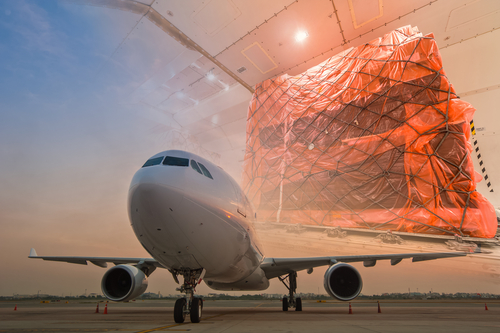Like the rest of the world, the air freight industry has been vastly affected by the global COVID-19 pandemic. According to Nabil Sultan, divisional senior vice president of Emirates SkyCargo, the current coronavirus outbreak is the biggest crisis ever faced by the air cargo industry – more so than all of the previous major crises such as the global financial crisis, Icelandic volcano eruption and US container port strikes, combined.
Here is how the industry is being affected by COVID, as well as how it is responding to these major changes.
Restructuring operations
In order to adapt to an entirely different environment than that of the pre-COVID market, the air freight industry is in the process of completely restructuring and reorganizing how it operates.
Due to the pandemic, there has been a major decline in passenger flights and a major increase in demand for cargo such as medical supplies and face masks. There has also been a significant uptick in the demand for perishable cargo such as meat and other groceries. As such, airlines are responding by converting passenger flights into cargo flights and passenger aircrafts into freighters. Some airports in the UK, for instance, are reporting as much as a 400% increase in cargo movements.
As cargo operations are absolutely essential in order to meet the demand for necessities like medical supplies, many cargo hubs have increased their operations and capacity, even opening up to capacity to new countries. However, while operations continue 24 hours a day, 7 days a week, staff levels have been significantly reduced. Remote working is not option for many air freight personnel – for instance, cargo handlers are necessary in order to receive and load cargo. These employees must grapple with a substantial increase in workload due to increased demand and reduced staff as well as rigorous sanitation procedures.
Increasing unpredictability
Furthermore, the pandemic has resulted in greater unpredictability within air freight. Flight scheduling is one of the most difficult aspects during the pandemic, as extra flights are constantly being added and flights are often being postponed or cancelled from day to day, resulting in continually fluctuating flight schedules.
As a result, airlines, airports and cargo handlers are having to be more flexible than ever to meet the swelling demand for imported and exported cargo during this time, particularly when it comes to vital cargo like medical supplies and equipment.
Says Pierre Perez, managing director at Global Services Handling (GSH), “We’re all pulling together – we know that our work is essential in order to transport goods and keep the local and global economy running. Helping to save lives by transporting medical products is also a real source of motivation.”
Future uncertainty
As with many industries, the effect of the coronavirus outbreak is expected to have consequences in the long-term. Says Sultan, “The way the economy is going to be impacted post COVID-19 is of course something that remains to be seen, but it is going to be a difficult and challenging year ahead for a lot of businesses, whether small or large. And then you have to wonder what sort of impact it will have on consumer confidence and purchasing power – the ability to go out there and buy and go on holidays and spend money. This will definitely have a much larger impact in the long term.” According to Sultan, growth may not pick up substantially again until 2023.
Zoe McLernon, Multimodal Policy Manager at FTA, adds that “There is no doubt that aviation will be slower to recover than most, particularly as passenger routes begin to reopen and while health screening and checks are developed and implemented.”


